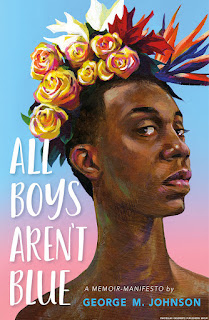All Boys Aren't Blue: A Memoir-Manifesto
Written by George M. Johnson
Cover Art by Charly Palmer
Published in 2020
Publisher: Farrar Straus Giroux (Imprint of Macmillan)
Reviewer: Debbie Reese
Review Status: Highly Recommended
****
The author of All Boys Aren't Blue is not Native, but on occasion, someone will ask me about the Native content in a particular book. That's the case this time. Here's the description:
In a series of personal essays, prominent journalist and LGBTQIA+ activist George M. Johnson explores his childhood, adolescence, and college years in New Jersey and Virginia. From the memories of getting his teeth kicked out by bullies at age five, to flea marketing with his loving grandmother, to his first sexual relationships, this young-adult memoir weaves together the trials and triumphs faced by Black queer boys.
Both a primer for teens eager to be allies as well as a reassuring testimony for young queer men of color, All Boys Aren't Blue covers topics such as gender identity, toxic masculinity, brotherhood, family, structural marginalization, consent, and Black joy. Johnson's emotionally frank style of writing will appeal directly to young adults.
I finally got a copy of the book and like so many others, was pulled in to Johnson's writing. There is such care in these essays! Some evoked tears. Chapter 10, "A Lesson Before Dying" is about his grandmother. The tears are about death but more than that, they're about truth. About being real with each other. What that feels like, why it matters so much.
My heart squeezed as I read Johnson's essays about his identities. He is Black. He is gay. I thought of the many young people who have already read his book and through Johnson's words, been wrapped in an embrace of who they themselves are. As I write this review, Johnson's book is showing up on banned book lists. My heart aches for those who are watching all that happening. It is an assault, on them, but the outpouring of support for Johnson signals a perseverance in the face of hate.
Now: the Native content. Chapter 5 is titled "Honest Abe" Lied to Me.
When I read the words in that title, I nodded. In that essay, Johnson writes about elementary school, third grade, especially, and the history they were taught (and performed) in a play about Thanksgiving, the Revolutionary War, the signing of the Declaration of Independence and the Emancipation Proclamation. He writes about a Thanksgiving poster that used to hang on the school that showed (p. 87):
... American Indians sharing food with the Pilgrims at the first Thanksgiving.
*takes deep breath*
What it doesn't show is that the Pilgrims stole the American Indians' food when they first arrived on the Mayflower, because they weren't prepared for winter.
I like that Johnson includes that because that particular holiday is coming up and kids across the country are being miseducated about it. Johnson's critique might not be noticed by some readers, but others--Native ones, especially--will notice and appreciate it.
Johnson's in-depth questioning of the history he'd been learning began in junior high (page 93):
We learned that Abraham Lincoln wasn't all he was cracked up to be. We learned about the Emancipation Proclamation, but also read some of the statements he made that weren't in the history books. The ones that were disparaging toward Black Americans and the fight for equality.
And (p. 93-94),
We learned that Lincoln had many thoughts that never seemed to make it into the pages of the history books.
He shares some of those statements made by Lincoln, including this one (p. 94):
"My paramount object in this struggle is to save the Union, and is not either to save or to destroy slavery. If I could save the Union without freeing any slave I would do it, and if I could save it by freeing all the slaves I would do it; and if I could save it by freeing some and leaving others alone, I would also do that."
Two years ago when Jean Mendoza and I visited a high school class that was using An Indigenous Peoples' History of the US for Young People we learned that Black students were taken aback by what we included about Lincoln.
There was--and is--no reason for anyone to go through painful moments learning the facts about Lincoln or any other person or moment in history. The information is available. Johnson and the students we worked with that day are, essentially, speaking clearly to those who will listen: tell the truth about history!
Truth.
That's what I find in All Boys Aren't Blue. The book is about Johnson's identities and it is about a country's identity. It is searing, and delivers one truth after another. I highly recommend it--and I recommend you read it. Pushing back on misrepresentations or mischaracterizations of books requires knowing what they say.


No comments:
Post a Comment